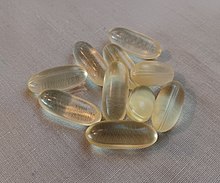Seaweed oil

Seaweed oil, also called algae oil or algal oil, is used for making food, with the purified product almost colorless and odorless.[1] It is also under development as a possible alternative fuel and manufacturing agent.[2]
Seaweed oil is also used as a source of fatty acid dietary supplement, as it contains mono- and polyunsaturated fats, in particular EPA and DHA, both of them omega-3 fatty acids.[3] The supplement's DHA content is roughly equivalent to that of salmon-based fish oil supplement.[4][5]
Seaweed oil is also used for biofuel, pharmaceutical manufacturing, massage oil, soaps, and lotions.[2]
See also
References
- ^ "Seaweed". Harvard University T.H. Chan School of Public Health. 1 August 2023. Retrieved 29 September 2023.
- ^ a b Farghali M, Mohamed MA, Osman AI, Rooney DW (2023). "Seaweed for climate mitigation, wastewater treatment, bioenergy, bioplastic, biochar, food, pharmaceuticals, and cosmetics: a review". Environmental Chemistry Letters. 21 (1): 97–152. Bibcode:2023EnvCL..21...97F. doi:10.1007/s10311-022-01520-y. PMC 9547092. PMID 36245550.
- ^ Scott D. Doughman; Srirama Krupanidhi; Carani B. Sanjeevi (2007). "Omega-3 Fatty Acids for Nutrition and Medicine: Considering Microalgae Oil as a Vegetarian Source of EPA and DHA". Current Diabetes Reviews. 3 (3): 198–203. doi:10.2174/157339907781368968. PMID 18220672.
- ^ Arterburn, LM (July 2008). "Algal-Oil Capsules and Cooked Salmon: Nutritionally Equivalent Sources of Docosahexaenoic Acid". Journal of the American Dietetic Association. 108 (7): 1204–1209. doi:10.1016/j.jada.2008.04.020. PMID 18589030. Retrieved 20 January 2017.
- ^ Lenihan-Geels, G; Bishop, K. S.; Ferguson, L. R. (2013). "Alternative Sources of Omega-3 Fats: Can We Find a Sustainable Substitute for Fish?". Nutrients. 5 (4): 1301–1315. doi:10.3390/nu5041301. PMC 3705349. PMID 23598439.
